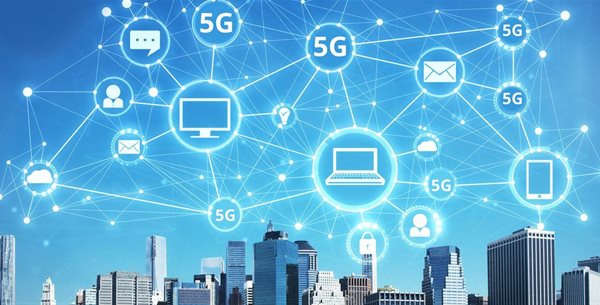5G brings opportunities for SA

Three South African mobile service providers – MTN, Vodacom and rain – recently announced the beginning of the 5G roll-out on their networks.
The transformative impact of the technology will immediately begin to be felt across sectors, but as the roll-out expands, it will begin to fundamental influence on the way we live, work and interact.
Faster, more affordable connectivity
A key advantage of 5G technology is that it is a more cost-effective way to serve more subscribers. The 5G roll-out will enable networks to serve more South Africans in rural areas at a lower cost, and begin to empower more people through access to connectivity.
“When building a base station, the biggest cost is the construction,” said Huawei Carrier CTO Paul Scanlan in a recent interview. “Because 5G components are more compact, the base stations are less expensive to build, which means coverage can be broader and more affordable. Customers then get a better service, at less cost. In this way, we continue to narrow the digital divide that deprives poor people of opportunities.”
“Where 5G has been rolled out, we are seeing significant growth in data services and the explosion of connected devices,” said Scanlan.
Another significant advantage of 5G over 4G is its lower latency – the time it takes to send information from one point to another.
5G provides quicker responses and more precise communication without lags. The change is significant enough to revolutionise communications that rely on fast linkages, such as gaming and the Internet of Things (IoT).
“5G is really a platform for transformation,” said Scanlan. “It gives consumers a whole new range of opportunities.
For businesses, augmented and virtual reality offers huge opportunities for training – not just in terms of effectiveness, but the speed with which knowledge can be transferred. When a trainee can experience situations in virtual reality, as they would look in practice, their knowledge is immediately more relevant and applicable. This will have enormous productivity benefits.
IoT will revolutionise the maintenance of plant, machinery and equipment, when thanks to low-latency communications, every piece of equipment will be constantly reporting its status and whether it requires maintenance.
Termed “predictive maintenance”, this will bring massive savings for companies, but also for entire countries when utilities such as energy, transport and water can be more effective and less costly to run.
Because of the vast benefits, it is also in the interests of countries to facilitate the licensing and approval of 5G, and the allocation of spectrum to 5G providers as soon as possible.
“Since 5G is such an incredible platform for transformation, once it is fully enabled, the benefits will increase by several orders of magnitude – for government, the economy and to industrial development,” said Scanlan.
The productivity benefits would boost the economy, creating new jobs in the information economy.
“We’re going to need new skills,” said Scanlan. “We’ll be upskilling people far more quickly, using 3D modelling and VR training. Where previously, a tradesperson might have to go through four years of classroom training, now, he or she can receive training practically, via remote learning, from industry experts anywhere in the world and become qualified in a fraction of that time.
Resource benefits
Remote monitoring, enabled by the greater speeds of 5G, can also support more precise management of agriculture. An example in the fish farming space would be monitoring and measuring fish to ensure the optimum feeding schedules.
For crop farming – under pressure from booming populations and climate change – 5G connectivity now allows constant measurement of soil nutrients and even satellite monitoring of fields to indicate when and how to apply fertiliser, adjuvants and pesticides for the best possible crop yields.
In mining, the faster connectivity of 5G means mines can now be run using automated vehicles and machinery, and managed by remote. This makes for greater mechanisation, fewer accidents between humans and machines and greater efficiency.
Economic enablement
Another component of the Fourth Industrial Revolution (4IR) likely to come into its own with the expansion of 5G connectivity is 3D printing, which will allow people to “print out” and create any specialised tool they might require in their choice of materials, on-site, at short notice.
Because of 5G’s greater speed and efficiency, it also carries sustainability benefits for the planet and for society, as it enhances efficiencies in the use of scarce resources. “As we build more 5G networks, we enhance our productivity, while keeping our carbon footprint similar, said Scanlan. It will even start to come down after a few years.
“The true benefits for countries, lie not in the selling of network licenses, but in the economic enabling factor that 5G represents,” said Scanlan.
He said he also saw 5G having the greatest impact through greater connectivity in the health, education and agriculture spheres.
Faster, better medicine
“Doctors and specialists can now practice remotely, thanks to the precision and accuracy of 5G connectivity, conducting more consultations over great distances, without patients even having to leave home. Surgeons can even perform operations using remote robotics to connect with the most skilled professionals in the world.”
The prospects of finding a vaccine and treatments for the Covid-19 pandemic are already being vastly enhanced by the capabilities of 5G to gather huge amounts of data, process it and share it with specialists around the world.
“Where previously, the research, testing approvals and distribution of vaccines might take a decade, now we might have a Covid-19 vaccine within a year,” said Scanlan. “We are only able to do that because we can access and process information more quickly thanks to greater connectivity.”
Another efficiency opportunity of 5G lies in the smart cities space, as faster, more precise connectivity using the vast amounts of data generated by IoT allows more precise management of traffic, water, energy and services.
As cities become more efficient, the economic benefits will flow to businesses and individuals. Ultimately, it will be individuals, collaborating and innovating, who will identify even more opportunities, exciting new ideas that will drive the next phase of human development.























